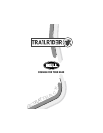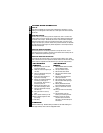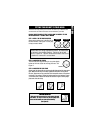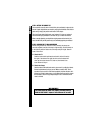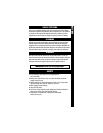
PLEASE READ CAREFULLY
HELMET USE
This helmet is intended only for pedal cyclists, skateboarders, rollerskaters, or in-line
skating. It is not designed for motor vehicle use or other sports. This helmet is certified
to EN 1078.
LIMITED IMPACT PROTECTION
Helmets reduce or prevent many injuries. But, impact forces, even in a common low
speed accident, can result in serious injury or death. Energy absorbing materials used
in helmets crush on impact. Sometimes, the blow can crush the material completely.
When this happens some of the force is transferred to the head. If the force is great
enough it can cause injury or death. Because every accident is different, it’s impossible
to predict when this might happen. Any helmet subjected to a severe impact should be
discarded and destroyed.
HELMETS CAN’T PREVENT ALL HEAD INJURIES
Some head injuries are not caused by impacts at all, but by other forces. You can
scramble an egg just by shaking it. You don’t have to break the shell to destroy the con-
tents. Helmets cannot prevent this type of injury.
HELMETS CAN’T PROTECT WHAT THEY DON’T COVER
The helmet will not protect the neck or any area of the head it doesn’t cover. Always
wear a helmet low in the front to protect the forehead. Make sure the helmet fits snugly
and the straps are adjusted to hold the helmet firmly in place when tightly fastened.
PARENTS:
A helmet is NOT a toy. DO NOT allow your children to use while climbing or in
other play activities, where a risk of strangulation exists.
ENGLISH
YOU SHOULD
ALWAYS:
1 Wear your helmet low in the front
to protect the forehead.
2 Fasten your buckle and tighten your
chin strap.
3 Check your adjustments every time
you wear your helmet.
4 Inspect your helmet regularly for
signs of wear or damage.
5 Replace your helmet immediately if
it shows any visible signs of
wear or damage. Helmets have a
limited life span of use.
6 Replace your helmet after an acci-
dent, even if no damage is visible.
7 Clean your helmet with mild soap
and water only.
8 Store your helmet in a cool dry
place.
9 Wear a helmet whenever you ride.
10 Wear a helmet designed for what
you’re doing.
11 Ride safely.
YOU SHOULD
NEVER:
1 Wear a helmet that’s been in an accident,
even if no damage is visible.
2 Loan your helmet to anyone.
3 Wear someone else’s helmet.
4 Wear your helmet with the buckle
unfastened.
5 Wear your helmet tipped back to
expose your forehead.
6 Wear anything under your helmet.
7 Wear this helmet while operating a
motor vehicle.
8 Make any attachments other than
those recommended in this manual.
9 Clean your helmet with chemical
cleaners.
10 Store your helmet in hot and damp
places.
11 Take unnecessary risks just
because you’re wearing a helmet.
12 Modify or remove any original
component parts of the helmet
other than as recommended by the
manufacturer.



